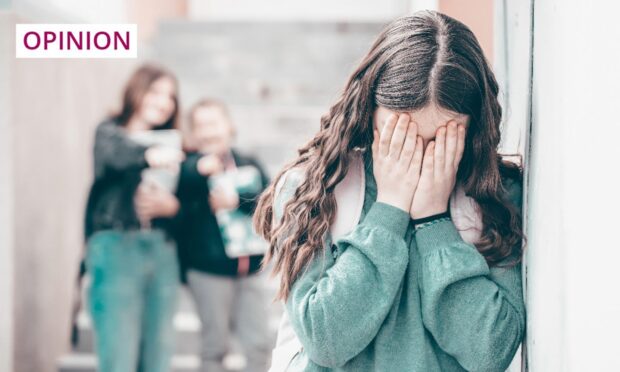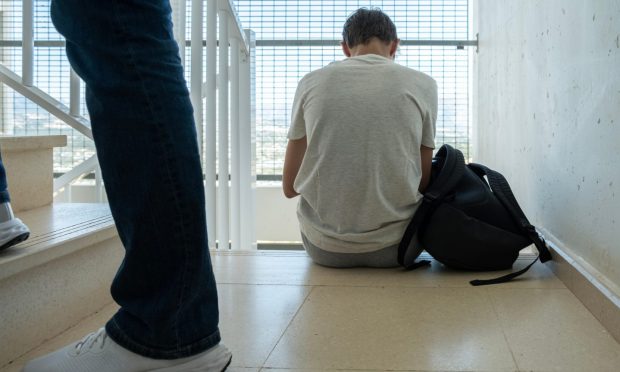I know a woman who was bullied at school as a child.
She was a textbook victim, with no poker face and woeful coping strategies. I mean, imagine rubbing dishwasher powder into your eyes to try to wangle a day off school? Talk about lame.
Of course, anyone who’s ever tried this will sigh and explain, patiently: “Stop screaming! It stings like buggery and all you get are puffy red eyes. God help you, showing up at school looking like that – do better!”
She was clever and sporty and wanted for nothing; not that she had everything, but nobody has everything and she had more than most. Home was safety. Friday was wonderful; Sunday, not so much. Sunday brought dread and wakefulness, like last week and the week before.
She sought comfort in sweeties because she was a child. Three Mars bars, one after another. The first, to guzzle and savour the sugar rush. The second, as punishment for being so weak, and the third – gross – to make her feel so ill that it was easy to throw them all up.
She wasn’t suicidal. But she did think, all the time and especially on Sundays, how great it would be not to wake up in the morning; not to have to deal with another day of it.
She thought how sorry everyone would be, if that happened, and fantasised about how distraught everyone would be at her funeral, especially her bully. They do say revenge is a dish best served cold.
It shamed her doubly, because there was no, well, not much physical violence. Taunts, insults and threats were all it took. Her stupid bully was clever, knowing which buttons to push.
She wonders if bullying is a skill that is learned, or are bullies born with it? Do bullies need to bully to validate themselves? Maybe it’s the manifestation of an instinct to conquer, or a release borne of jealousy that can’t find its outlet on the playing field or in the classroom or anywhere else in normal life.
Whatever. None of that sort of conjecture existed at the time and even if it had, it wouldn’t have made any difference.
If it hurts them now, it will hurt them forever
Even while it was happening, she was ashamed of her inability to stand up for herself. She was ground down by it all. But the mortifying thing was, if she told you what each taunt and threat was, they would sound small and insignificant in the school-of-hard-knocks scheme of things. It was cumulative, and it worked.
She loosed her connection to her bully eventually, not through her own bravery but rather through the simple workings of time and the school system. But she was never the same again.
Her carefree, early childhood self was left flat on the classroom floor where the harm had taken place, and was never scraped back up. She wonders if her bully did the world a favour – maybe she’d have turned into an insufferable show-off if her confidence hadn’t been taken away.
Don’t think it’s silly kid’s stuff and that they’ll shake it off. Or forget about it. They won’t
She’ll tell you that she was fundamentally changed by her experience, and she’ll agree that it happened a long, long time ago. But she has an important message.
She’ll implore you to look out for your eight, nine, 10, 11 year olds; to listen to what they are going through. Because she promises that if it hurts them now, it will hurt them forever.
Don’t think it’s silly kid’s stuff and that they’ll shake it off. Or forget about it. They won’t. They will be altered as a result of it. Kids never grow out of a childhood fear of an oppressor who got away with it.
She watches TV interviews where people talk about traumatic events in their childhood and say: “I’m a different person now”, and doesn’t believe them. Nobody becomes a different person, whether they experienced past trauma or not. The same child is still there, only with a brave, adult identity worn on top like a costume, pushing on through.
More than 40 years on, effects of bullying are still felt
She suggests that if you’ve never been bullied then you are fortunate, whether by circumstance or by your own strength of character. Those to whom it happened live out their lives in a state of trying not to let it happen again.
Maybe they become bullies themselves. Maybe they go to absurd lengths to avoid conflict. Maybe they are appeasers. Befrienders. Maybe they’ve blocked it out. But, whatever they’re doing, they’re using up a lot of emotional energy in the doing of it when they should be living their authentic lives without all this nonsense.
More than 40 years on, that woman I know is still, first and foremost, ashamed that she was too weak to stand up for herself, and hates that her bully saw that, too. She truly believes she brought it on herself.
If you are a bully, and you know it – of course you do – you should be ashamed of yourself. But you’re probably not, are you?
The bullied child would have said that she hopes the kick you got out of your cruelty is one day redirected onto your own miserable backside. But, then, from inside her grown-up costume, she hopes you’ve found peace from your demons and wishes you well.
Erica Munro is a novelist, playwright, screenwriter and freelance editor





Conversation